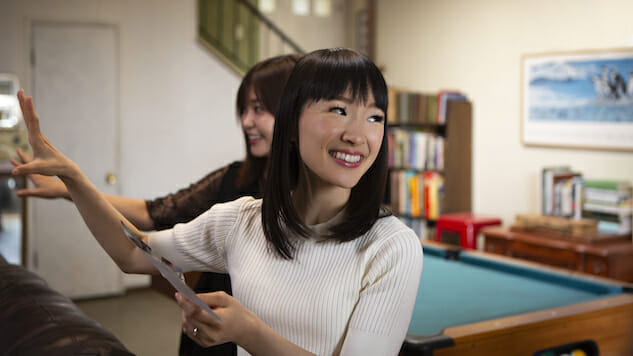Netflix’s Tidying Up With Marie Kondo Will Spark Joy in Even the Most Cynical Viewer
Photo: Denise Crew/Netflix TV Reviews Tidying Up with Marie Kondo
They say “thoughts create things,” meaning we tend to manifest what we expect to see, but as it turns out, things also create thoughts. Even things you don’t believe you’re thinking about at all, much less thinking those thoughts about.
Sometimes, someone on television (or in real life) makes a comment. About “joy.” And I guiltily stow the urge to belt that person because the pompous sanctimony—or the veiled hint that this person is on intimate, personal, gnostic terms with “joy”—has made me feel like a jerk, an impostor, a joyless misanthropic shit. I might even give in to the temptation to wonder if there is something legitimately wrong with me that I don’t get “joy” from Labradoodle puppies or the endearing quirks of the crazy lady at the post office or a screaming toddler at the coffee shop. The word “joy,” the concept of joy, really should not prompt a tailspin. But in the wrong hands, or if it lands on the wrong ears at the wrong time, it has that potential. Once you start questioning your capacity for joy, other people holding forth on the concept become seriously abrasive. And once you start questioning yourself because you don’t derive “joy” from your sports bra or your socks or your condiments, you might really have a cow. So, at first blush, it might not seem like a TV show where a tiny and terrifyingly cute woman exhorts people to locate joy in their old paperwork or sweatpants or dog toys is likely to be a good match for you.
But Tidying Up with Marie Kondo will convince the most cynical among us that it’s reasonable to derive joy from every single thing in your house, and that anything you’re hanging onto that doesn’t provoke a joy reaction should be seriously held to account. What does it mean for a sweater to “spark joy”? Well, when you pick it up and hold it, it should make you literally make a ringing bell noise out loud. Brrrrrrriinnnnng! Like that. Kondo has a joy-noise. She also chirps “folding clothes is so much fun!” in a way that makes you wonder what’ll happen when she enters the jam-packed closet of a woman who doesn’t know how to deal with the personal effects left behind by her spouse of 40 years who has recently died. Or what’ll happen when a young mother is asked to confront the mountain of clothing she wants to keep for when she gets her old body back. Seriously, when you’ve been a size 4 for most of your life, are you likely to feel “joy” gazing at the size 12 jeans you’re currently wearing? I’d have trouble with that. Is reverently folding the sheets into neat squares going to suddenly make up for the fact that your bed is a lot emptier than you’d prefer? It gets deeper than “being organized” pretty fast.
What’s interesting about Tidying Up is that it isn’t especially voyeuristic—and that seems to be what makes it work. Kondo skims the spaces she enters, maintaining a polite distance (she mostly speaks Japanese, which keeps a certain veneer of non-enmeshment between her and her generally English-speaking, Angeleno subjects). Most of the heavy lifting is done when she leaves, in solitude. She has a “method,” but she also has a point: minimizing, paring down, organizing, all the things she calls “tidying,” are about closing the gap between who you want to be and who you are on a given day. Most of us are probably not only holding onto a lot of stuff we don’t need or want; we’re also unaware of how much entropy those things are creating, or how they reflect people’s power dynamics, or how those dynamics can be changed by decluttering. It’s simple—almost ridiculously so—and surprisingly profound. Your environment is a reflection of your relationship with yourself, and when your environment is peaceful and respectful and harmonious, you cannot help feeling that way as well.
If you have never done this, it might be an interesting exercise to listen to your possessions and see what they’re really saying. Because it might be pernicious stuff like, “You don’t deserve to move on.” Or “There is no room in your life for anything better than this.” Or “You have no control.” These are falsehoods. So, if your living space is whispering them to you, it’s worth making some adjustments.
Tidying Up with Marie Kondo is now streaming on Netflix.
Amy Glynn is a poet, essayist and fiction writer who really likes that you can multi-task by reviewing television and glasses of Cabernet simultaneously. She lives in the San Francisco Bay Area.